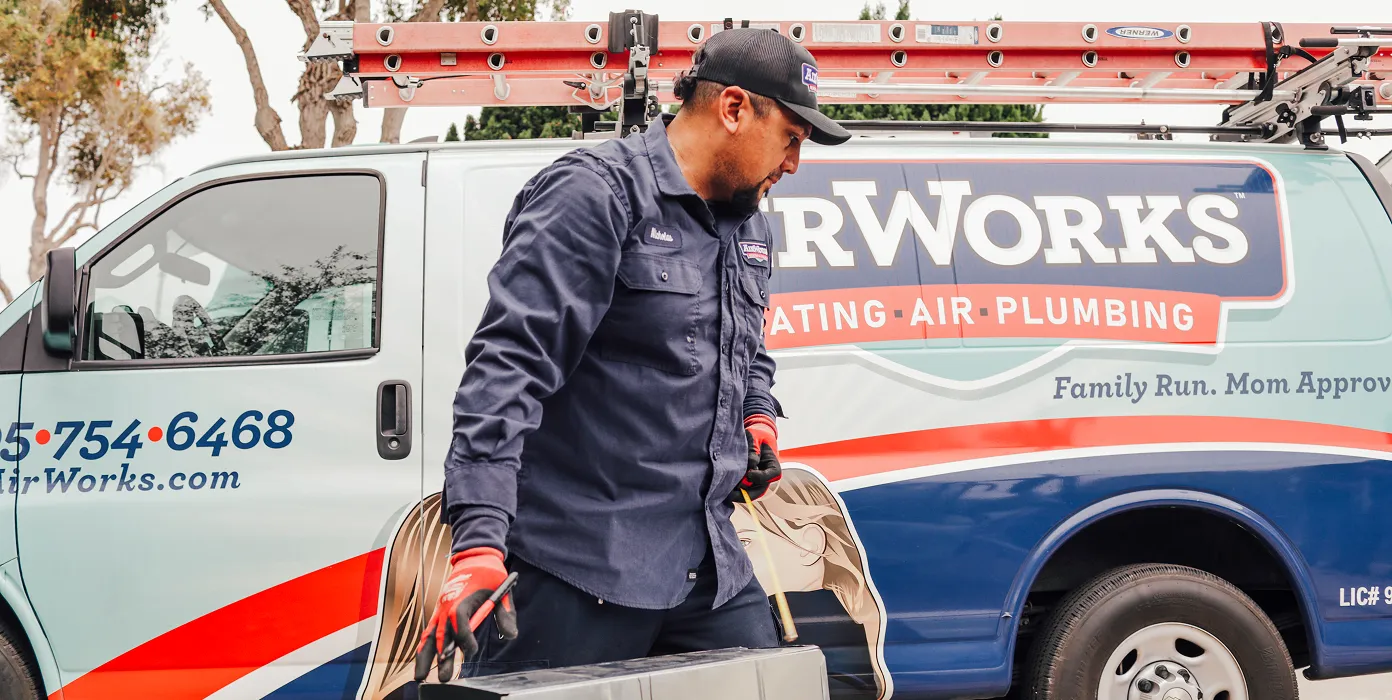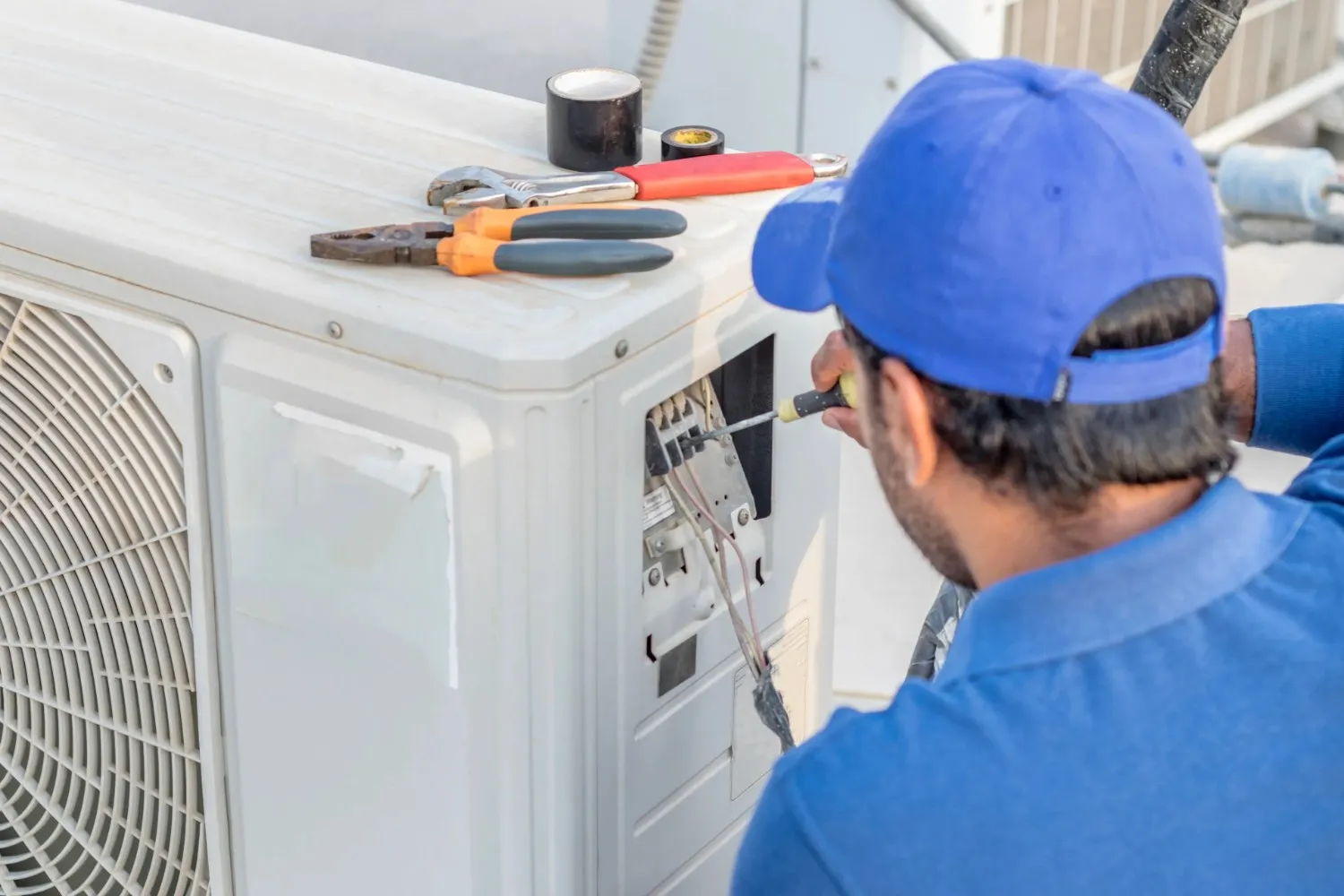Heat Pump Maintenance in Lake Sherwood, CA
Serving Ventura & Sacramento Counties

Heat Pump Maintenance Lake Sherwood, CA
Keeping a heat pump running efficiently is critical for year-round comfort in Lake Sherwood, CA. With warm, sunny summers and mild winters, homes here rely on heat pumps for dependable cooling and heating. Regular heat pump maintenance preserves efficiency, prevents costly breakdowns during peak season, and extends equipment life. This page explains what professional heat pump maintenance covers, common issues in Lake Sherwood homes, the diagnostic process, typical repairs, seasonal preparation, and recommended maintenance intervals.
Why heat pump maintenance matters in Lake Sherwood, CA
Lake Sherwood experiences high cooling demands in summer and occasional cooler periods in winter. Local factors that affect heat pump performance include:
- Dust and pollen from inland canyon winds that quickly dirty coils and filters
- Seasonal wildfire smoke which degrades indoor air quality and clogs filters faster
- Salt air influence is lower than coastal areas but occasional marine breezes can still increase corrosion risk for outdoor components
- High run-times in summer that accelerate wear on compressors, capacitors, and fan motors
Routine maintenance keeps refrigerant levels, airflow, electrical components, and controls operating correctly so your system meets comfort needs without wasting energy.

Common heat pump maintenance issues in Lake Sherwood homes
- Dirty condenser and evaporator coils reducing heat transfer and efficiency
- Low refrigerant or slow leaks causing reduced cooling/heating and possible compressor damage
- Reversing valve problems that prevent switching between heating and cooling modes
- Worn start capacitors or contactors creating hard starts or intermittent operation
- Fan motor or blade damage lowering airflow and stressing the compressor
- Clogged air filters and condensate drains leading to reduced airflow and moisture issues
- Thermostat calibration errors or control board faults affecting cycle timing
- Short cycling caused by improper refrigerant charge, airflow restrictions, or electrical problems
Typical heat pump maintenance process
A professional heat pump tune-up focuses on preventive diagnostics and adjustments designed to restore factory-level performance. A comprehensive maintenance visit generally includes:
- Visual inspection: Check outdoor unit for debris, corrosion, damaged fins, and proper clearance
- Clean coils and fins: Remove dirt, dust, pollen, and leaves from the outdoor condenser and indoor evaporator coil to improve heat transfer
- Replace or inspect air filters: Confirm filter condition and recommend replacement intervals based on home conditions
- Measure airflow and temperature split: Verify system is delivering correct supply and return temperatures
- Refrigerant check: Measure system pressures and temperatures to confirm correct refrigerant charge and look for signs of leaks
- Electrical inspection: Test capacitors, contactors, relays, breakers, wiring integrity, and compressor amp draw
- Reversing valve and defrost control: Exercise the reversing valve, inspect for proper operation, and test defrost cycle for heat mode performance
- Compressor health indicators: Check start/stop cycles, abnormal noises, and running amps to detect early compressor failure
- Condensate system: Clear drain lines and inspect secondary safety switches to prevent water damage and mold
- Thermostat and controls: Calibrate thermostat, verify sensor placement, and update control settings
- Report and recommendations: Provide a clear summary of findings and maintenance items that improve efficiency and reliability
What technicians look for when checking the reversing valve and compressor
- Reversing valve: Technicians listen for proper switching and check electrical/actuator operation. Symptoms of failure include inability to change modes, unusual noises during switch, and system stuck in heating or cooling. Replacing a failing reversing valve is more involved than routine service and is generally addressed if diagnostics confirm malfunction.
- Compressor: The compressor is the heart of the heat pump. Pros test starting current, running amps, and perform a performance comparison between measured pressures and manufacturer specifications. Signs of trouble include high amp draw, frequent short cycling, oil or refrigerant leaks, and abnormal vibration or noise.
Common repairs and solutions explained
- Refrigerant leak repair and recharge: Locate and repair leaks, then recover, evacuate, and recharge to factory-spec charge. A proper repair prevents recurring low-performance and compressor damage.
- Capacitor and contactor replacement: These are common wear items that cause hard starts or intermittent operation. Replacing worn starters restores reliable cycling.
- Fan motor and blade repair: Damaged blades or failing motors reduce airflow and stress the compressor; repairs restore proper airflow and balance.
- Reversing valve replacement: Required when the valve sticks or the actuator fails; necessary to restore heating/cooling mode changes.
- Coil repairs or coil replacement: Severely corroded or damaged coils may require repair or replacement to regain efficiency.
- Control board or thermostat replacement: Modern systems depend on reliable controls; replacing faulty boards or thermostats eliminates erratic behavior.
Recommended maintenance intervals for Lake Sherwood homes
- Professional inspection and tune-up: Annually at minimum. For Lake Sherwood, consider a biannual check—spring for cooling season and fall for heating season—because of heavy summer use and seasonal smoke/dust impacts.
- Air filter inspection: Monthly visual checks; replace every 1 to 3 months depending on filter type and local air quality.
- Coil cleaning: At least once per year; more often if your property experiences heavy dust, nearby construction, or wildfire smoke.
- Refrigerant and leak test: Annually during a professional tune-up
- Electrical component check: Every maintenance visit to catch wear before failure
- Condensate drain service: Annually, or whenever you see slow drainage or water near indoor equipment
Seasonal preparation and local tips
- Pre-summer: Clean outdoor area, trim vegetation to maintain clear airflow, clean coils, check refrigerant, and verify thermostat cooling set-points.
- Pre-winter: Test heat mode, inspect the reversing valve, ensure defrost controls work, and confirm backup heat or furnace integration if present.
- After wildfire smoke events: Replace filters sooner, have a technician inspect coils for soot buildup, and consider enhanced filtration for indoor air quality.
- Protect outdoor unit: Keep the condenser clear of yard debris and consider a light cover for winter storage if your system is rarely used in cold months. Do not seal the unit completely; covers can trap moisture and cause corrosion.
Benefits of timely heat pump maintenance
- Improved energy efficiency and lower utility costs
- Fewer unexpected breakdowns during peak season
- Extended equipment life and preserved manufacturer warranties
- Better comfort with consistent temperatures and humidity control
- Improved indoor air quality by removing accumulated dust and particulates
- Early detection of issues that are less costly to fix than emergency replacements
Regular, professional heat pump maintenance tailored to Lake Sherwood conditions protects comfort, reduces running costs, and preserves system lifespan. Following recommended intervals and addressing issues like refrigerant leaks, reversing valve faults, and dirty coils promptly will keep your heat pump performing reliably through hot summers and mild winters.
Keep Your System Performing at Its Best
Regular service is the key to preventing unexpected breakdowns and maximizing the lifespan of your equipment. With professional heat pump maintenance in Lake Sherwood, CA, you ensure consistent performance, cleaner air, and lower long-term operating costs. At the center of this care is AirWorks Heating Air Plumbing, known for its detailed inspections, expert diagnostics, and tailored recommendations. Our team checks every component—electrical, refrigerant, airflow, and controls—to keep your system running safely and efficiently. We also help you stay ahead of wear with maintenance plans that fit your home’s usage and needs.
Schedule your heat pump maintenance with AirWorks Heating Air Plumbing today for performance you can trust.


